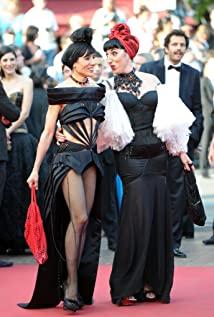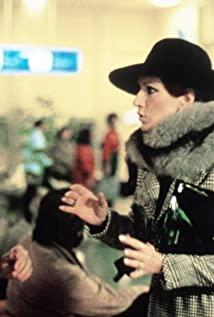Pedro Almodóvar's "Julietta" (2016), based on the short story "Silence" by Canadian writer Alice Munro, is very reminiscent of a walnut tree, covered with There were delicious peaches, but none were picked. In different ways, the film makes Julieta lose her father, husband and daughter successively, making this woman who is like a whirlpool dazed and helpless.
Silence is also a form of restraint. Bergman said, "Stravinsky likes to express himself and writes a lot about his own work. Since he has a volcano inside him, he always needs to restrain himself." According to this, the film is more like a The cunning hunter set up a game, and this trap made the audience unbearable, like a sword that was always hanging high, standing on the top of the head, and the cold light shone in all directions, making it difficult for people to settle down. Yes, people can't help but ask why Julieta's daughter Antia ran away from home at the age of 18, and it was not abrupt when she left. It is normal and reluctant to say goodbye to mother and daughter.
Antia will go to a mountain for recuperation to heal her mental illness. Three months later, when Julieta drove from Madrid, the administrators refused to meet the mother and daughter on the grounds that Antia did not want to see her. Julieta couldn't figure out why her daughter didn't want to meet her. She had to find the answer, but she insisted that she couldn't meet her daughter. She was an adult and she had the right to decide everything. In the first few years, my daughter would send a blank greeting card on her birthday, and she was too lazy to write a single word.
Similarly, for the three birthdays after her daughter disappeared, Julieta would prepare a birthday cake, put candles, and after standing in front of her, she would still angrily turn to the trash can. Anger is justified, but it doesn't solve the problem. In this respect, mother and daughter are very similar. Originally, he and his lover, Lorenzo, made an appointment to live in Portugal, but she met her daughter's childhood friend Bilt on the street and said that she had met Antia somewhere out of town, and she was fine.
This prompted her to stay in Madrid alone, and Lorenzo was of course disappointed. She moved back to the old house where she used to live with her daughter, and walked through the streets every day, looking forward to seeing her daughter's figure. When she returned to the house, she wrote a letter to her daughter, telling her about the light and shadow of her relationship with her father when she was young.
Flashbacks to the past are not easy. It turns out that Hu Lietta is a substitute teacher of classical literature at a university. During a trip, an old man in the car said, "Maybe we can be a companion", which made her feel dreadful, so she came to the dining car and encountered a focus on the car. Outside the window, an elk galloped chasing the train, which aroused Julieta's curiosity. When the two started talking, they found out that his name was Xuan, from a remote Galician seaside fishing village, a fisherman with three fishing boats. He said his wife Anna had been in a coma for five years.
After they said goodbye, at this moment, the conductor found something in front of him and came to the emergency brake. As a result, he was injured and fell down. However, Julieta found that the old man in her car had long since disappeared. When she opened his bag, it was empty. She suddenly realized that she ran out of the car and saw Xuan and several men carrying a man covered in white cloth. He must be the one who wanted to die. The old man, but she didn't understand why he made such a decision. What is the relationship between the flying elk and the old man, or is it just an expression of images, indicating that Julieta's turbulent life.
That night, Xuan accompanied her on the train, and the two hugged together to keep warm, and naturally had the excitement of burning. Not long after, she received another letter from him, just as her substitute career was over and she could visit him, so a fisherman fell in love with a city Kochi. When Xuan was not at home, the housekeeper Marianne told her that Xuan's wife Anna had just passed away, and told her that Xuan had a lover, the ceramist Ava. This was unexpected by Julieta. But Almodovar will certainly do so.
The two got married anyway, because she knew she was pregnant before she left. After that, she had a baby Antia, and took her back to her hometown of Andalusia for a while, only to find out that her father had a good relationship with a young foreign worker named Zanna. Her mother could only lie in bed all the year round, almost old. Demented and needs Zannah's care. Heterosexual families are often so unbearable and fragmented in Almodovar films.
The father wanted his daughter to understand and tolerate him, not to mention that the mother needed Zannah's care. Julieta's impatience with her father was the same as Antia's incomprehension of her years later. After her mother died, her father naturally lived with Zannah, and had a young son. When he called Julieta, he said that you had a little brother. She was so embarrassed by the disappearance of her daughter, how could she care? Listen to the babble of the old father.
On the eve of the storm, 9-year-old Antia went to summer camp. She begged her mother not to fire poor Marianne, but Julieta said her husband was sick and needed someone to take care of her, not her. Julieta is contradictory about the relationship between Ava and her husband. On the one hand, she likes to go to the pottery studio to watch her elaborate pottery works. On the other hand, out of instinct, she questioned the relationship between Xuan and Ava, and the husband told him lightly. She, they are just a physical relationship and have never lived together, so she can rest assured that he loves his wife.
Xuan went to sea in the morning, and then the storm came. At night, she fidgeted and turned on the TV, only to find out that all three people on a fishing boat were killed, including Xuan. Julieta couldn't face it at all, Ava comforted her, but she still had to think about how to tell her daughter in the distance, because the daughter loved her father the most and always joked about being a female fisherman. But the daughter called happily and said that she had met her friend Bilt. After the summer camp, she hoped to go to Madrid to play. Bilt's mother reassures Julieta.
After everything was arranged, Julieta also came to Madrid, just in time for Bilt's parents to travel abroad, just for her to live with their two children. Knowing that her father had passed away, Antia did not blame her mother for her special performance, but comforted her and helped her to rent an apartment. The mother and daughter lived here in Madrid. But Julieta always lives in a trance.
Time flies, and the daughter grows up. When Antia and Bilt hold the shivering Julieta in the bathtub together, cover her with a turban to dry her hair, and lift the turban, it is the face of another Julieta. Middle-aged Julieta, this is just a replacement for the actors. This kind of eager face change reminds me of the black and white classics of Hollywood in the 1930s and 1940s, which often have such instant results.
Julieta waited for nothing but endless searching. There is also genetic inheritance. It's not so much that she is trapped in the grief of her missing daughter, but rather that she wants to find the reason and the answer.
There is a scene in the film, when she returns to her native fishing village and finds Ava, who has suffered from multiple sclerosis, Ava sends her the last pottery work "Thinking Man". Ava said that in fact, Antia often talked to her when she was a child and asked about some things. At this time, she met Lorenzo, a writer, and the two felt sympathy for each other. He said that everyone has the results they deserve, the beauty and frustration of the promise.
But because of Antia, their relationship has not come to fruition. Under normal circumstances, Almodovar is unlikely to give heterosexual love and marriage a happy direction, let alone the result. This is not to blame the great director, but his temperament and habits. From the time he made his first film to the present, all the high-quality works have been marked with this embarrassment without exception. Or maybe it's his specialty. But I like his "Living Colors", especially "Talk to Her", which is the pinnacle of his creation, and then gradually fades away.
The dramatic part of the film is that when Julieta meets Bilt again, Julieta sadly says that I hadn't seen Antija for 13 years. Only then did Bilt truthfully say that the meeting was actually very unpleasant, and Antia, with her two children, wanted to avoid her. It turned out that their friendship had long since broken up, and Antia accused her, saying that I was ashamed of our friendship, and she went to New York to study design to avoid Antiya.
This is all unknown to Julieta. The mother thought that it was only because of her that her daughter chose to leave. It turned out that the main reason was mixed with compound factors. Julieta, who was wandering alone, saw Lorenzo across the road, whom she hadn't seen for many years. In a trance, she was eager to cross the road and was hit by a car. Fortunately, it was only a skin injury.
During the healing process, I received an unprecedented letter from my daughter, writing very sincerely, saying that I am now a mother of 3 children, and my eldest son's name is Xuan. He drowned when he was 9 years old. When I was the most painful, I Thinking of you and the hurt my disappearance has brought to you, I can't imagine what kind of pain you endured. On the way she and Lorenzo drove to see her daughter, she said I didn't want any explanation from her, I just wanted to be with her. Lorenzo said 13 years later, she finally figured it out.
What a painful realization. This warm ending that everyone is happy is a little restrained, and it is really a bit anti-Almodovar style, and it is also quite critical. I think, with the growth of annual rings, changes in mentality are inevitable. On the whole, the style of the film is calm. The beauty of the lens is the same as that of the previous director's work, which can be described as meticulously carved, and it does have the look of a Hollywood classic. It's just the painful plot itself, which seems normal but contains turbulent waves.
It is often said that the biggest mistake in life is negligence. Neglect what you have said and done. Unintentional is taken as intentional. Mindless is also considered mindful. This is how daughters see their mothers. She felt that her father's death was directly related to her mother, and she even felt that her mother lacked sympathy, and she was so determined towards the poor housekeeper Marianne. This long-standing misunderstanding all stems from the daughter's take for granted. Take everything for granted and fail to listen and communicate.
Similarly, "Julietta" is in the vortex of pursuit, looking for answers that do not exist, struggling in the clouds and shadows of right and wrong. But "Julietta" is destined to place too much hope for Almodovar that he doesn't want to say too much. The film undoubtedly wants to connect the complex life and examine love, marriage and family as a whole.
In the end, the "thinking person", who caused the thinking, fell into exhausted questioning, which made people feel too persistent and futile. The still and steady shots of the film have such a great contrast with the presented images, perhaps, this is what Almodovar wanted to achieve. But I still want to say that Julieta reminds me of a walnut tree, a tree full of delicious peaches.
2016, 8, 30
View more about Julieta reviews











